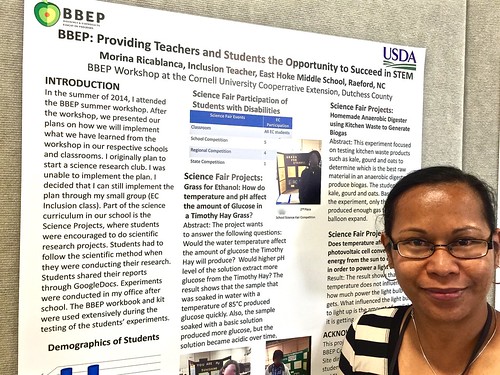
Being an educator is in Morina Ricablanca’s blood. Growing up in a family of teachers in the Philippines, she knew she would someday pursue a career in education. Ricablanca participated in an outreach program assisting troubled youth while attending Manuel L. Quezon University Law School in Manila. She realized then it was time to join the family business of teaching.
Her decision has led her to a successful career working with special needs students at East Hoke Middle School in rural North Carolina. Ricablanca was named the “2014 Teacher of the Year” for her school district, partly due to her work helping three of her students win the school’s science fair.
In 2014, she attended the Bioenergy and Bioproducts Education Program (BBEP) workshop in Horseheads, New York. BBEP is an education program administered by Cornell University with $5 million in funding from the U.S. Department of Agriculture’s National Institute of Food and Agriculture (NIFA) through the 2010 AFRI Sustainable Bioenergy Challenge Area.
“The workshop provided me the skills and knowledge I needed to teach about renewable sources of energy, which is part of our school’s science curriculum,” said Ricablanca. “I hadn’t thought of doing bioenergy projects with my students because I never considered the different biomass we have all around us that can be used to make bioenergy products.”
The three projects conducted by her students include a study of how temperature and pH affect the amount of glucose Timothy grass will produce; an experiment on testing kitchen waste products, such as kale, gourd, and oats to determine which is the best raw material for an anaerobic digester to produce biogas; and a study determining if temperature affects how a photovoltaic cell converts light energy from the sun to electricity in order to power a light bulb.
“My students did not think they could win a competition because of their challenges,” she said. “BBEP provided the opportunity for them to succeed and see that they can achieve great things in life.”
All three projects went on to win the East Hoke Middle School science fair.
“This was the first time in our school’s history that we had this many students with special needs win the science fair competition and represent the school in the regional and state competitions,” she said. “The impact is not just on my students, but also on the school, parents, and especially me. It reminded me why I continue to do what I do.”
The BBEP will hold its next workshop in Washington, DC, Aug, 10-13, hosted by the University of Maryland – Eastern Shore.
“I encourage teachers to attend agricultural workshops to gain a better understanding of the role agriculture has in our daily lives,” Ricablanca said. “We are educating the next generation and if we do not provide the opportunity to learn something new about agriculture, then we have failed our students.”
NIFA invests in and advances agricultural research, education, and extension and seeks to make transformative discoveries that solve societal challenges.
